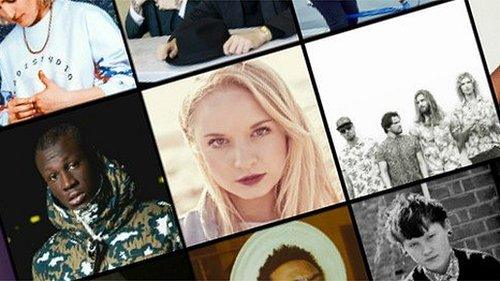BBC Sound Of 2015: Stormzy interview
- Published
Stormzy's guide to his South London (Video production by Dan Curtis)
Unsigned grime artist Stormzy has come third in the BBC's Sound Of 2015 list, which aims to showcase emerging artists for the coming 12 months.
Born Michael Omari in Croydon, south London, the MC calls himself "a child of grime" who rejected slick US hip-hop for Britain's harder, grittier scene.
At the age of 11 he was winning rap battles at his local youth club, and his charismatic freestyles have earned him a huge following on YouTube.
Championed by Radio 1Xtra, he became the first unsigned rapper to appear on Later... With Jools Holland last year, going on to win a Mobo for best grime act.
"It's been beautiful, but there's been a lot of hard work and thought put into it as well," he tells the BBC.

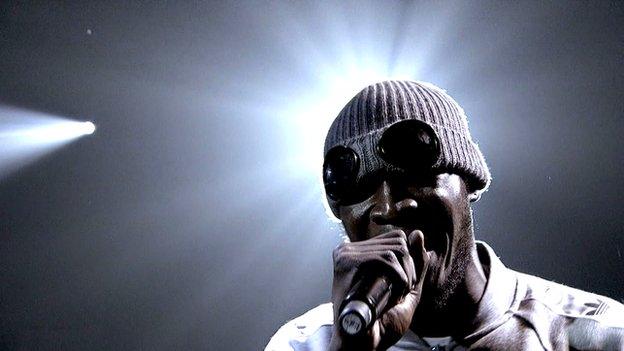
The musician was booked for Jools Holland on the strength of a solitary EP, The Dreamer's Disease
How does it feel to come third on the Sound Of 2015 list?
That's a bit of an overachievement for me, I can't lie. Especially being an unsigned act and an MC, it's overwhelming.
Grime seemed to disappear over the last few years. Why do you think that is?
I'm not sure why - but one thing I do know is that it never went anywhere. Even though it wasn't being promoted at a mainstream level, it was still happening.
For a long time, the scene has needed unity - a few people to come in and do the right thing. So I think me, as a young artist, an upcomer, I just came at the right time.
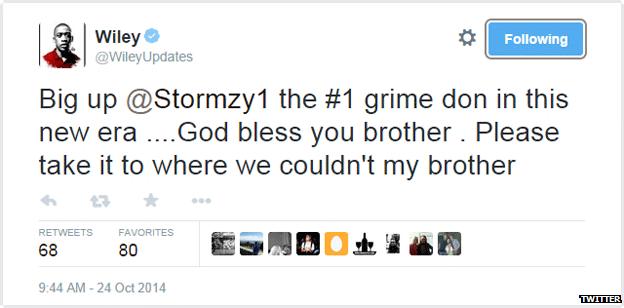
In October, Wiley called you the "grime don, external" and said "please take it to where we couldn't". How did that feel?
That was mad. That was a lot of pressure when I heard that. These people like Wiley and Skepta opened the doors. They built the foundation for us, so now it's for us to take it even further. Hopefully in 10 years time I'll be saying to a new MC, "I hope you take it where I couldn't."
To outsiders, any music with spoken lyrics is rap. How would you explain the difference between what you do and, say, Kanye West or Jay-Z?
What I'm doing is British. It stems from the same culture as US hip-hop, but the way we dress, the way we speak, the way we perform is so different. It's UK street culture.
In Not That Deep, you rap about being "stopped on the road" as a result of your YouTube videos. Does that happen a lot?
It does, it does. Ever since the whole buzz, it's been happening quite a lot. People always reference that lyric now as well.
What's the strangest place you've been recognised?
I went to pick up my nephew from primary school and one of the teachers there stopped me and said, "my son listens to you". That's quite an awkward thing.
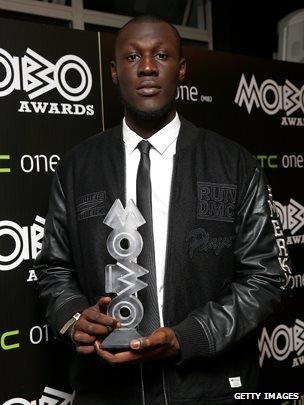
Stormzy beat Wiley and Skepta to win a Mobo for best grime artist last October
Another song that stands out is Storm Trooper, which deals with domestic abuse. Why did you decide to tackle that topic?
That was an idea that was presented to me by an artist called TE dness [who sings on the track]. It's actually something that he'd been through personally. But as an artist, I like to talk from perspectives I may not have been through.
I may not be able to give an eyewitness account but Storm Trooper has a universal pain running through it. You wouldn't have to have been in a domestic abuse relationship to understand the pain.
Was there a lot of music in the house when you were young?
I would love to say I grew up on 2Pac and The Beatles but I didn't.
My generation, me and my friends, we grew up on grime. We grew up in the era of Sony Ericsson phones, Walkman phones. There'd be a few grime tunes circulating in the area and we'd send them to each other by Bluetooth.
We used to listen to Krept and Konan, So Solid… These were all south London artists. People who were actually around me.
When was the first time you thought "I'm going to have a proper go at this"?
I've always been doing music but I've been so inconsistent. So the first time was November 2013, when I dropped a video called Where You Been and started my campaign.
While I was doing that, I was actually working on an oil refinery, in quality assurance. It was quite a niche job, so they had to train me up for 10 months.
It got to March, April and the music was picking up, so I had to make the decision - project engineer or musician? I decided to take the music path and here we are.
Do you remember handing in your notice?
I didn't actually hand in my notice, I just left. I couldn't really tell my mum. I knew how she would take it!
Did she want you to stay in work?
My mum's always had big aspirations because I'm an academic. I always got good grades at school. GCSEs were just a breeze for me.
I went to college but that's a time when education requires a lot more focus and a lot more dedication and I couldn't click with it, so I dropped out and went to work.
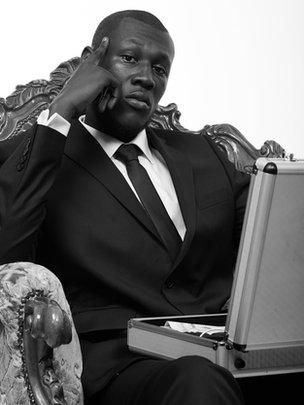
"It’s very difficult to do it by yourself - we delegate tasks and everyone makes sure I’m not slipping up"
You've done so well as an unsigned artist, you must be fighting off the record labels.
I'm at that period now where people are showing an interest, but nothing's happened. I'm focused on the music. All the politics and that, I don't pay attention to. But there's a lot of interest. A lot of interest.
But you could demand anything you want - a car made of bacon and custard - and it'd be yours...
People overestimate how big it is to sign or not to sign. Don't get me twisted, it's probably one of the biggest decisions you'll ever make in your life - but in terms of focusing on being signed or not being signed, that's not a good space to be in.
I think you've got to be in a creative space all the time. I try to make sure decisions aren't made hastily. They're well thought-out. There's a lot of patience.
Is it fair to say you approach this like a business?
Yes it is. For a long time, I was actually doing it by myself. Up until September last year I was going to all these meetings with the labels, doing the PR, taking bookings, all by myself. I finally noticed, "nah, I can't do this," so I gathered a small team, a few brothers who I've grown up with, and we thought up a plan.
They keep me good. It's quite easy to get caught in the routine of fooling off. They keep me in check, I keep them in check. It's very family-orientated like that.
What do you mean by fooling off?
Getting complacent. Partying every night. Not being in the studio. You're losing sight of the goal.
People underestimate the fact that we plan and strategise and structure what we're going to do. We keep it calculated.
- Published5 January 2015
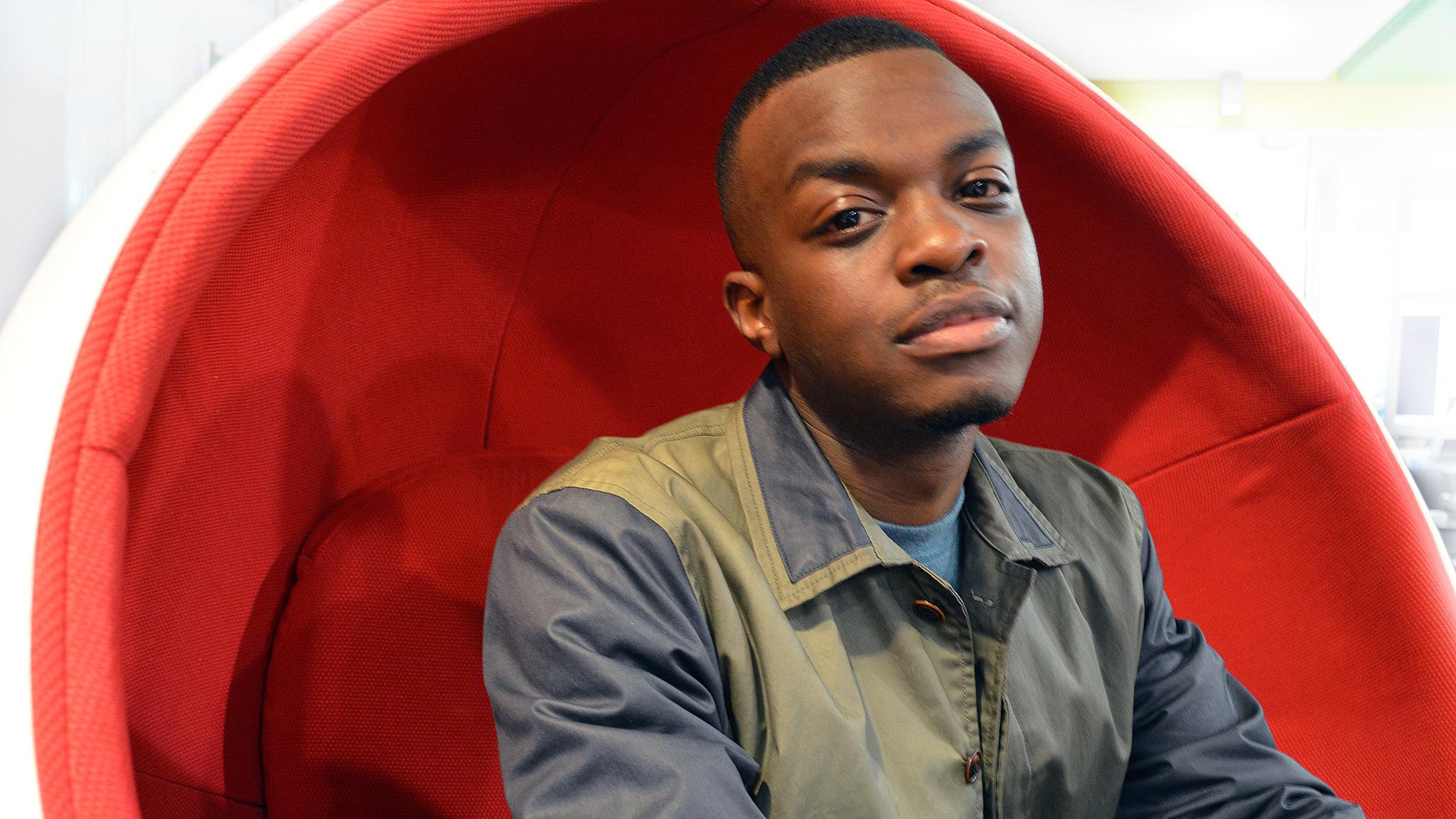
- Published6 January 2015
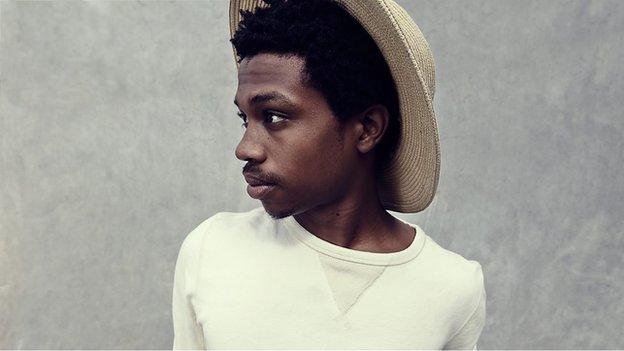
- Published1 December 2014
